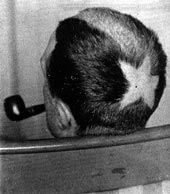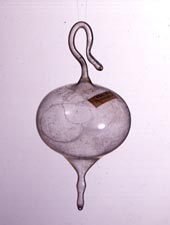|
|
||||||||
|
Duchamp's 'R's The prevalence of excessive "R"s in Duchamp's uvre may seem to hold a clue for those who care, or "ose"----dare, to look. After all a Frenchman struggling with the English language might pronounce those "Rs" as "arse" a term which refers in colloquial English speech to a measure of daring. Duchamp so loved to use colloquial speech and puns. And to all accounts he loved, as the Americans say, to "get some arse," his pursuit of the ladies being legendary. The influence of Raymond Roussel on Duchamp is often cited but not sufficiently documented. The double R's of Raymond Roussel's initials figure into Duchamp's female pseudonym: Rrose Sélavy.(1) This name could be a conscious tribute to Roussel, Duchamp here giving him life. Rrose Sélavy / Roussel, la vie--Roussel, life. This could be a measure of his respect for Roussel.
One of Roussel's later plays was called L'Etoile au Front--the Star on the Forehead. Duchamp's famous haircut in which he had a star cut into the hair on the back of his head may be a joke in which he has reversed the forehead, in French "le front," or in English pronunciation, the "front" of his head, for the back. The significance of Duchamp claiming to be a "breather" is also connected to Roussel and the excessive "R." The word "hair" when pronounced with a heavy French accent "air" is a homophony to the French pronunciation of the letter "R"--Roussel's initials, RR. Every time Duchamp evokes an "R" he is evoking not only Roussel, his own haircut, but also the "Air" which he so relished.(2) Duchamp's gift to Walter Arensberg of a glass phial of Air de Paris continues the trail. The French pronunciation of the letter "R" is also a homophony of the word "err" to wander, stray or to err in the English sense of making an error. The "Air de Paris " Air of Paris that Duchamp gave Arensberg in the United States does in fact err, or wander, from Paris--"Air / err de Paris." Duchamp, as an expatriate, had also wandered from Paris--"il err de Paris"--he wanders/strays from Paris. There is also a lexical link between Air de Paris and Duchamp's later Monte Carlo gambling spree. This lexical link continues as "Paris" is not only the name of a city but the plural of the noun "pari" which means in English--"bet" or "wager." Duchamp's "Air/Err de Paris," the "error of bets" prefigures his recognition of his Monte Carlo betting spree as an error of judgement. Returning to Duchamp's gift to Arensberg, "Air de Paris," we have established that the words "Air" and the French pronunciation of the letter "R" are homophones. "Air/R de Paris." If we substitute the English pronunciation of the letter "R" for the French pronunciation of the same letter "R," which is pronounced the same as the English word "Air," we can see a further correlation. The letter "R" when pronounced in English is also the equivalent of the French pronunciation of the word "art," the "t" being silent. Hence in substituting the French pronunciation of the letter "R" = English "Air" with the English pronunciation of the letter "R" = French "Art," we have, instead of "Air de Paris," "Art de Paris." This is in fact what Duchamp gave Arensberg. "Art" from Paris, which was Air. Equivalences. Looking once again at Duchamp's use of the double "R" of Roussel's initials we can, in applying a similar cross linguistic procedure to the interpretation of this usage, extrapolate from the "Rr" of Rrose Selavy--in English/French pronunciation "Art err"(3)--Art errs. Or Art (with a capital A--high art) errs or wanders--Art/R errs/r--ose Selavy--ose, c'est la vie--dare, that's life. Art has entered into life. Similarly one can extrapolate Art/air--ose c'est la vie. Art/air--dare that's life. Art and the air of life are equivalent. Dare to breathe. Duchamp may have made a further comment on the status of art through his use of the double "R." In a reference to Jarry he says "Arrhe is to art what merdre is to merde."(4) Arrhe--from the (feminine) word for a (monetary) deposit--arrhes, and art, similarly to merdre and merde, are homophones in French. Duchamp's cynical interpretation of the relation between art, money and shit/shitte is here presented succinctly. Jarry's "merdre" is similar to money in the bank, a deposit or "arrhe" and "art" is placed similarly to shit. "Arrhe" and "art" are in French homophones with the English pronunciation of the letter "R." There is a further stress on the letter "R" with the redundant "R" in Jarry's neologism "merdre."(5) This redundant "R" recalls the redundant "R" of Rrose. It seems Duchamp's stress on the redundant "R/art" may be a cynical statement about the status of art. If the redundant "R/art" (from "merdre") is placed similarly to "arrhe" or cash in the bank what would we deduce from this? That this type of monetarily motivated art is shit? Enough about "R"s "arse" and their extrapolations. Maybe we have wandered too far or maybe we just err and its time to find some fresh air. Notes
Figs.
1, 2
|














